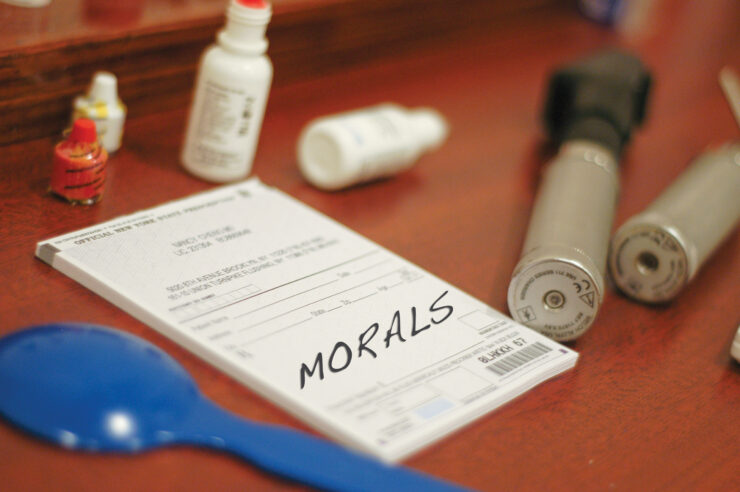The University of Ottawa recently implemented a change to the medical school curriculum, in light of the new assisted dying legislation brought forth in June 2016.
In a recent interview with the Fulcrum, Dr. Jeff Blackmer, U of O professor of medical ethics and vice-president of medical professionalism at the Canadian Medical Association, explained that the changes at the U of O will be in how the concept of assisted dying is taught.
“Until now, teaching has focused on other aspects of care at the end of life, such as palliative care and withdrawal of life-sustaining interventions. When assisted dying was discussed previously, it was in the context of court cases or failed government bills.”
Later in the interview, Blackmer noted that “(Students) will not be forced to observe or participate directly if it is against their moral conscience to do so.”
While the Fulcrum applauds the U of O’s Faculty of Medicine for updating their curriculum to reflect modern medical legislation, we believe it sets a bad precedent to suggest that doctors in training can brush over important medical procedures, simply because they have moral reservations about performing them.
The first thing to note is that Canada’s physicians are paid through our tax dollars. If a tax-paying Canadian wants to receive a legal medical service, no matter how morally controversial, it is the doctor’s duty to perform that service.
If you are against assisted dying, and you are a physician, it is still your duty to bring an objective lens to your practice and perform the services that are in your patients’ best interests. It is not your job to treat somebody based on your own moral compass.
We can look to a plethora of examples, aside from assisted dying, to model why prescribing morals has a decidedly adverse effect on Canadians seeking healthcare.
In July 2016, an Ottawa-based woman carrying twins sought a selective abortion procedure after being told that, due to her age, the risk of losing her entire pregnancy was high. However, after being referred to Mount Sinai Hospital in Toronto for the procedure, the woman received a vague email saying that the procedure was available in the United States, although failing to specify where.
A representative from Mount Sinai later revealed that the “conscience of the clinicians” at the hospital would not let them eliminate one of the two twins. It was only after the woman filed a complaint with the Ontario Human Rights Tribunal that she was directed to the Sunnybrook Health Sciences Centre, where she received the operation.
While it’s appalling that an established hospital like Mount Sinai would make a woman seeking medical aid go through such a labyrinthine referral process, this entire obstacle course could have been avoided if the doctors had simply put their patient’s care ahead of their personal morals.
Even abortions that don’t involve the painful choice of terminating one fetus over another are routinely restricted due to moral reservations of physicians or of the hospitals in which they operate. In Ontario, only 17 per cent of hospitals provide abortions, and all abortion clinics but one are located in Ottawa and the Greater Toronto Area. Access wouldn’t be a huge problem if hospitals were more commonly providing abortions, so why the hesitation? Is reproductive rights still such a taboo topic that even Ontario hospitals aren’t willing to touch it?
South of the border, a similar debate ensued when Andrew Cash—a former counseling graduate student at Missouri State University—sued the university for discrimination, since they did not allow him to continue his co-op after Cash refused to counsel LGBTQ+ couples at his placement. One can easily imagine the damage that would be caused by mental health therapists refusing to provide services on the basis of personal homophobia or other discriminatory “morals.”
Both of these situations serve as warnings that must be heeded during Canada’s implementation of assisted dying services.
When physicians can arbitrarily decide that providing assisted dying to a suffering patient is against their morals, there are a slew of consequences other than a minor inconvenience to the patient.
As seen with the current state of Canada’s abortion services, when doctors can base their medical practices on their personal morals, the procedures deemed legal in Canada’s legislation are not necessarily accessible. If the rollout of this service follows the pattern seen with abortion services, rural areas may suffer from a lack of assisted dying options. If someone is in a state of extreme suffering, and has been approved to receive an assisted dying procedure, can you imagine how traumatic it would be for them and their loved ones to travel in order to retain that service?
Assisted dying is a newly approved procedure in Canada, and there is still time to prevent the inequalities that have littered the path to receiving other controversial procedures, like abortion. Canada stands on the precipice of a new service’s entry to the mainstream, and ensuring it is equally available and stigma-free across the nation will depend highly on the ability of physicians to leave their morals at the doorstep.
This revised mindset begins with the education received by incoming physicians. And the U of O, along with other Canadian medical schools, can be a driving force in destigmatizing and improving access to politically controversial procedures—starting with assisted dying.




